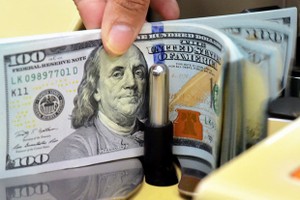Taxation strategies taken by the business sector to rebound from the global economic crisis, including the role of banks, were discussed at a workshop organized Tuesday in Ho Chi Minh City by the UK-based Association of Chartered Certified Accountants (ACCA) and the Vietnam Taxation Consulting Association.
Two highly experienced consultants, Mr. Chas Roy Chowdhury, ACCA’s Taxation Department head, and Ms. Nguyen Thi Cuc, former deputy head of the General Department of Taxation of Vietnam and chairwoman of the Vietnam Taxation Consulting Association, were the speakers at the workshop, joined by almost 400 participants from Hanoi and HCM City.

About the global fiscal backdrop, Chowdhury said, “It’s the pay back time for banks now. The general perception is that banks caused the current global problems.”
He described the backdrop as “the worst global downturn in generations.”
“They [the banks] received special treatment in being bailed out by tax payers, and now the world wants pay back.
“Regulatory changes have been proposed as well as the structure of remuneration and bonus payments.
“However, governments in many countries want revenue from the banks as pay back and to fill their budget deficits.”
Banks are global while tax measures are national, he said, adding that any national measure will risk capital flight.
In the context, the International Monetary Fund (IMF) considers it important that there should be global coordination, said the ACCA expert.
IMF recognizes that where gaps exist in the global community then there will be room for arbitrage, Chowdhury said.
IMF suggests two taxes on banks and financial institutions – a levy to produce a fund for future help to banks called a “Financial Stability Contribution,” and a “Financial Activities Tax,” which is not a Tobin tax, he said.
Tobin tax is a financial transactions tax, while FAT would be a tax on the sum of profits and remuneration of financial institutions, he explained.
IMF discusses this and says even set a one basis point could raise US$200 billion, Chowdhury added.
Also about IMF view of the global fiscal backdrop, the British consultant said countries not operating a tax “contribution scheme” were asked to be good neighbors in a similar way to that of tax havens. Other countries should not adopt favorable tax treatment to those business areas affected by FAT.
Regarding tax policies, the British expert said, “Tax policies in development countries like Vietnam would better be simple. Particularly with regards to corporate income tax, special tax fines cut and simplification of the system are recommended.”
Sharing experience on how to encounter crisis, Chowdhury said, “Companies need to be fully aware that in times of crisis, cash is the most important asset and they need to pursue debts effectively to make sure that customers pay their debts on time as the debt payment plan should be closely controlled.”
Meanwhile, Ms. Nguyen Thi Cuc, former deputy head of the General Department of Taxation of Vietnam and chairwoman of the Vietnam Taxation Consulting Association, gave her advice.

“First, the corporate sector has to fully capitalize on tax incentives provided by the Vietnamese government.
“In addition, companies should effectively tap their internal strengths and improve competitiveness to protect and expand market share, overcome challenges and broaden business.
“They need to use comprehensive actions, including upgrade managerial capacity and application of technologies, to efficiently cater the needs of Vietnamese consumers and increase exports.”
The Vietnamese tax consultant also talked to the audience about important issues associated with tax filing for 2009, profit or loss consolidation and loss carry-over.
























